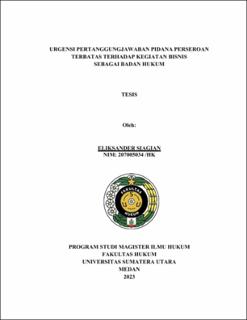| dc.description.abstract | The unclear regulation of criminal liability of limited liability companies is a
major obstacle in the eradication of criminal acts committed by limited liability
companies. Although a limited liability company has been established as a legal
subject and can be held criminally liable, in its enforcement it is still very rare for a
limited liability company to be sentenced. This research focuses on the study of the
regulation of criminal liability of limited liability companies; the urgency of
regulating the criminal liability of limited liability companies in their business
activities; and alternative models for resolving the criminal liability of limited
liability companies that need to be applied in Indonesia.
This research uses descriptive analytical normative legal research method with
statutory approach, case approach, and conceptual approach. Literature study
technique is used to obtain secondary data which includes primary, secondary, and
tertiary legal materials. The data was then analyzed using qualitative data analysis
methods and deductive inference.
Based on the results of the study, it is concluded that there are 3 (three)
variations of criminal liability arrangements for Limited Liability Companies, namely
the management as the perpetrator of the responsible management, the limited
liability company is recognized as committing a criminal offense but the
responsibility is imposed on the management, and the limited liability company
commits a criminal offense and can be held accountable in criminal law. The
regulation of criminal liability and the imposition of punishment against limited
liability companies is an urgency because the current regulation of criminal liability
has not been able to fulfill the objectives of law, namely certainty, justice, and
benefits. The use of a limitative dual track system model can be an alternative model
for criminal liability of limited liability companies with the consideration that the
settlement path through a restorative approach will still coexist with the criminal
justice path. | en_US |


